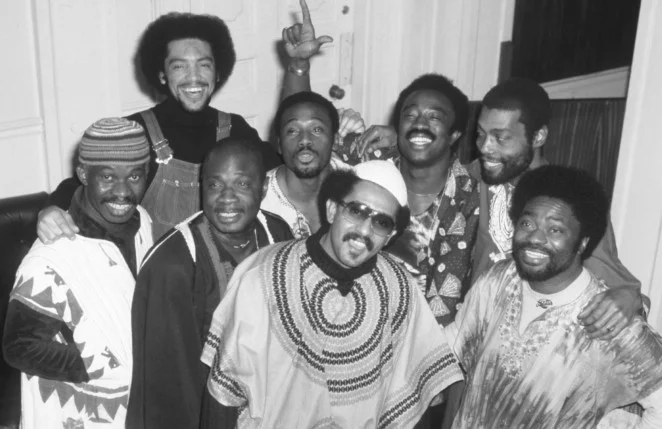Formed in the late 1960s by Teddy Osei, this band has become one of Ghana’s greatest and biggest bands to have graced the music world, inspiring many young ones across generations. But what is the genesis of Osibisa?
Teddy Osei, a musician and multi-instrumentalist is the name behind the formation of Osibisa. This Afro-rock band was founded nearly a decade in London after the British officially entirely left the shores of Ghana following centuries of control. The membership of the band was made of four West African natives including Teddy Osei, Sol Amarfio and Mac Tontoh from Ghana and Lasisi Amao from Nigeria. The rest of the band’s members were Wendell Richardson from Antigua, Roger Bedeau (Spartacus R) from Grenada and Robert Bailey from Trinidad. These four people made up the famed band which was named from the Ghanaian word “Osibisaaba” the name given to the kind of music based on the mixture of “palm wine” music and the Fante Fisherman traditional music. Simply put, the Osibisa band means “criss-cross rhythms that explode with happiness”.
Teddy Osei played the saxophone, flute, and African drums and vocals. Sol Amarfio played the guitar and percussion while Mac Tontoh (Kweku Adabanka Tonto) handled the drums. Abdul Loughty Lasisi Amao played the percussion and tenor saxophone. Spartacus R was behind the bass, Robert Bailey played the keyboards and Wendell Richardson played guitar and vocals.
The band captured and amazed the audience through its explosive rhythms, stage vibrance and charisma which led to other top musicians seeking advice from the band’s leader Teddy Osei on improving their stage performance. Some of those to have reached out to the Ghanaian for advice were Stevie Wonder, The Rolling Stones and Paul McCartney.
Their fame soon crossed the borders and led them to international tours which took them to Australasia, Japan, India and many African countries including Zimbabwe where they performed at the country’s independence. At that time they were joined by Kiki Gyan, Daku Adams and Paul Golly.
Osibisa Albums and Success
As a testament to their great work, the band released several hit albums in the days which included the famous “Woyaya” which came after the release of their debut album eponymously named Osibisa. Those two albums peaked at number 11 in the UK charts. The band released “Heads”, “Superfly” (soundtrack for the Superfly T.N.T movie released in 1973), “Happy Children” and “Osibirock”. Also released before the turn of the decade were “Welcome Home”, “Ojah Awake” and “Mystic Energy”.
However, after a decade of massive success, the band toned down with the number of albums released. It only released three albums during that era including “Celebration”, “African Flight” and “Movements”. African Dawn, one of the albums recorded at the time was not released until 2003 when it was released coupled with the earlier released African Flight.
Though the band had not been very active in the late 1990s and early 2000s, it has continued to release remastered versions of their songs while also releasing remixes and re-recorded versions. The band’s top compilations also include Spirits Up Above in 1972, Best of Osibisa in 1973 and Osibisa Likes (India only) in 1981. African Criss Cross, Africa We Go Go 1992, Uhuru, The Warrior, Ayiko Bia, Jambo, Gold, and Celebration: The Best of Osibisa came through in the 1990s. Criss Cross Rhythms, The Very Best of Osibisa, Hot Flashback Volume 1 and Sunshine Day: The Very Best of Osibisa all joined the class of the 1990s compilations.
Influence and Style of Music
The 1969 African-Caribbean roots band has remained one of the most influential bands in the history of African music. Ghanaian veteran producer Hammer the Last Two said his maiden project which was hiplife legend Obrafour’s “Pae Mu Ka” album was inspired by a song from the Welcome Home album released by Osibisa in 1975.
Osibisa based on its roots had its music rooted in African style mixed with rock, progressive rock, acid rock, Latin, jazz, afro-funk, jazz fusion, soul, highlife, reggae, calypso and pop. Though popularly themed afro rock, afro-pop, highlife and progressive rock, the band detoured with their Mystic Energy album by doing R&B, disco and dance-pop.
Original Traits, New Generation
After 54 years of action in the music industry, Osibisa is still much alive today even in the now-revolutionized music space. Still present in the band are Teddy Osei and Robert Bailey who are founding members of the band as well as Greg Kofi Brown, a veteran of the band. New members of the band include Faye Jones, Colin Graham, Stephen Amoah-Duah, Angie Amra Anderson, Paul Bilson, Alfred Kari Bannerman and Shagzy Olusegun.

The band in April 2021 released their new work, the New Dawn which is their first since 2009 and exactly 45 years since the band’s 1976 hit album Sunshine Day debuted in the UK charts. They have become the first signing of the new Marquee Club label, 50 years since they broke The Marquee Club at a live gig in 1971.
Discover more from afkmediaonline
Subscribe to get the latest posts sent to your email.




























+ There are no comments
Add yours